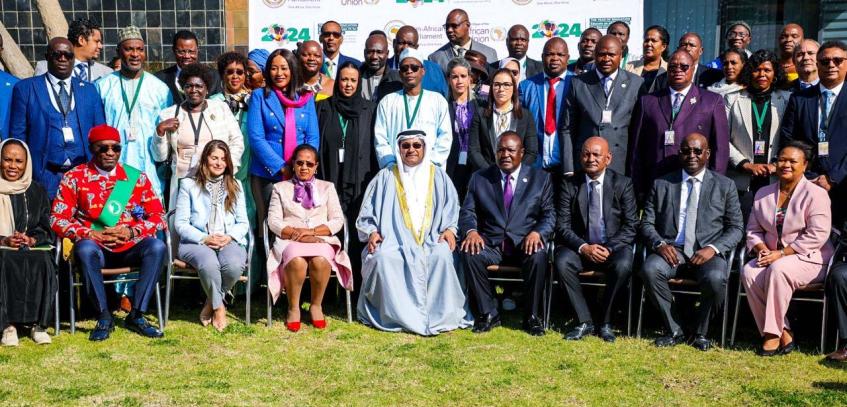The 3rd Ordinary Session of the Sixth Parliament of the Pan-African Parliament (PAP) commenced today at its seat in Midrand, South Africa, and is scheduled to run until 5 July 2024. This session centers on the African Union's 2024 theme: "Educate an African Fit for the 21st Century: Building Resilient Education Systems for Increased Access to Inclusive, Lifelong, Quality, and Relevant Learning in Africa."
The AU Agenda 2063 represents a transformative blueprint for the socio-economic renaissance of Africa over the next 50 years, aspiring to create an integrated, prosperous, and peaceful continent. Driven by its own citizens and representing a dynamic force in the global arena, the AU places education at the heart of its development strategy, aligning it with the global Sustainable Development Goals (SDGs).
This theme highlights the essential role of education in advancing Agenda 2063 and the SDGs, with PAP serving as a cornerstone in the African Union's framework to achieve these goals. Despite significant strides in education over the past two decades, disparities persist across Africa. According to UNESCO, over one-fifth of children aged 6-11 and one-third of youth aged 12-14 are out of school. Additionally, nearly 60% of youth aged 15-17 are not in school, and youth literacy rates in Sub-Saharan Africa average around 77%, compared to the global average of 95%. These statistics reveal Africa's significant shortfall in developing resilient and inclusive education systems. Addressing this gap requires overcoming obstacles such as poverty, malnutrition, gender inequality, disability, and displacement.
Agenda 2063's Second 10-Year Implementation Plan (2024-2033) focuses on holistic capacity development, transforming Africa's youthful population into a productive force. Moonshot 6 envisions empowered African citizens, with strategic objectives aimed at increasing access to all levels of education, ensuring primary education completion, boosting tertiary enrollment, improving healthcare and nutrition for regular school attendance, promoting gender equality, reducing youth unemployment, and encouraging entrepreneurship. Additionally, tackling health issues like malnutrition and substance abuse will ensure students fully participate in educational activities. These initiatives are in alignment with the AU's 2024 education theme and Moonshot 6, fostering an environment conducive to lifelong learning.
The role of the Pan-African Parliament is pivotal in facilitating the translation of AU policies and treaties, initially proposed as initiatives, into national legislation, thereby ensuring compliance and enforcement by member states. During the ongoing 3rd Ordinary Session, the Pan-African Parliament will prioritize supporting the AU’s Continental Education Strategy for Africa (CESA) 2016-2025 and the education-related SDGs, with a particular focus on SDG 4. By harmonizing its legislative and oversight responsibilities with the AU's strategic goals and collaborating closely with pertinent organs within the Union’s framework, the Pan-African Parliament can effectively catalyze the adoption of policies that promote inclusive and high-quality education at the national level.
The Parliament has set out to advocate for educational reforms that prepare African youth for economic opportunities presented by the African Continental Free Trade Area (AfCFTA). Emphasizing STEM and Technical and Vocational Education and Training (TVET) will ensure a skilled workforce for a competitive market. Supporting universal primary education, healthcare, gender equality, and youth empowerment aligns with Agenda 2063's vision of inclusive growth. Facilitating educational exchanges and free movement policies will enhance learning and educational opportunities across the continent.
The presence of Hon. Adel bin Abdul Rahman Al Asoomi, Speaker and President of the Arab Parliament, at the opening session represented the deepening cooperation between these two legislative entities. This partnership holds immense potential to address shared concerns, particularly peace and security, which are paramount for both the AU and the Arab League, given that most member states of the latter are also members of the former.
These challenges significantly hinder development, especially in education and the implementation of the African Continental Free Trade Area (AfCFTA). The 3rd Ordinary Session of the Sixth Parliament is a strategic thrust in enhancing Africa's global engagement, notably advancing Moonshot 7 of Agenda 2063 through robust governance and strategic partnerships. Solidarity messages from the Ambassador of Palestine to the Republic of South Africa, along with the European Union Ambassador to the AU, were a display of the recognition of Africa’s voice and relevance in international negotiations and the promise of Africa’s unified stance on global issues.
Key AU organs such as the African Court on Human and Peoples' Rights, African Commission on Human and Peoples' Rights, and the African Peer Review Mechanism also reaffirmed their support for the Pan-African Parliament during the opening session. These collaborative efforts, including on the AU’s Common Position on UN Security Council reforms and the OAU Convention to eradicate mercenaries in Africa, can best be pushed through the Pan-African Parliament whose members are best placed to advocate for continental aspirations within their national parliaments.








